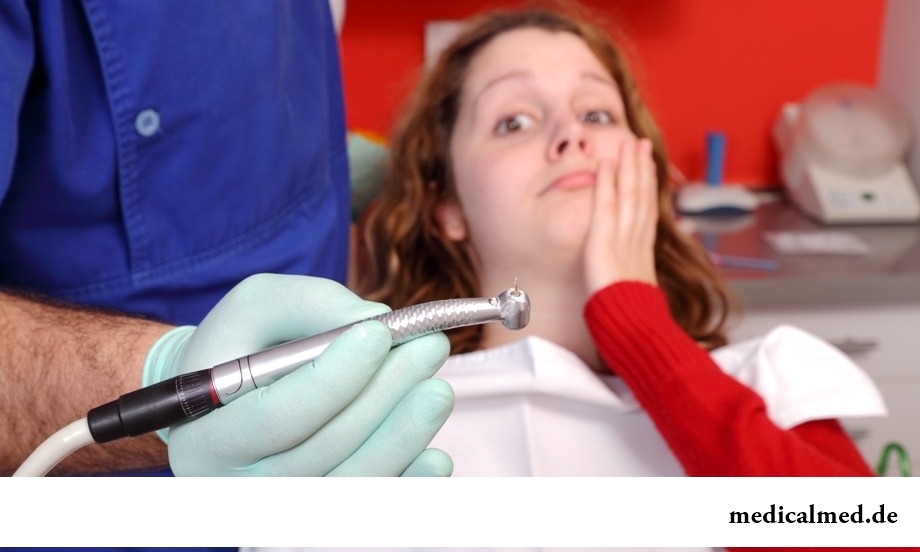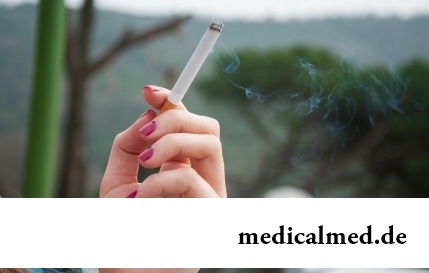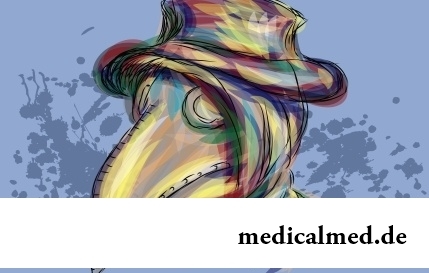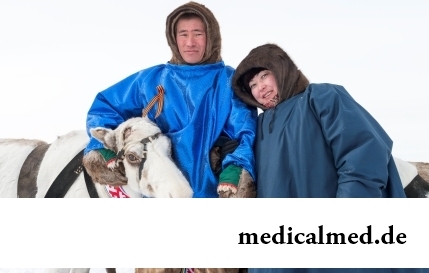





Why Russians are afraid of stomatologists?
Statistically, can only one of ten of our compatriots brag of a decent condition of an oral cavity. Six teeth affected with caries are the share of the average Russian. For comparison, this indicator for Europeans is almost six times less.

Situation with prevalence of dental problems can be considered really catastrophic, and business here not only in non-compliance with rules of hygiene or general hobby for sweets. As it is not sad, many Russians just are afraid to visit offices of stomatologists.
Problem sources
Certainly, you should not consider all people who are afraid of dentists, pants. With morbid conditions such fear has nothing in common too: unlike phobias, this fear is substantially proved by that situation which developed in domestic stomatology within several decades.
Specific responsible for formation in the society of the negative attitude towards dentists was "public and absolutely free" the Soviet medicine which was formed on the principle of total economy. On assistance to each patient to the doctor it was allotted several minutes of time and rigidly limited volume of materials. Too were almost not engaged in updating of the equipment in district and local clinics (where most of the population was treated). As a result stomatologists worked with the help of the antediluvian equipment, and were forced to fill a tooth from material which collapsed literally in the eyes.
Especially unpleasantly the principle of economy affected use of medicines: practically all procedures were carried out without anesthesia. Many Russians even had a certain style of behavior: carious tooth pain was muffled analgetics until its state did not begin to demand removal. It was the only way to get rid of a problem at least with the minimum anesthesia. Dental care was fraught with such stress that people who visited the doctor only with the preventive purpose met very seldom.
Certainly, doctors were delighted not with current situation too: to work with the patient who shakes with fear or writhes from pain, difficult and unpleasantly. Stomatologists found a way out as they could: great psychologists who were able to find approach to patients met (however, the "soothing" conversation with the patient was not included into standards of time). Doctors who preferred to treat a fright of patients as to a whim, and did not consider it necessary to hide the discontent about it came across (and it is quite frequent). Imperfection of the used materials often led to unpleasant effects: seals dropped out, there were inflammatory processes. Situation was aggravated with the fact that in medicine the principle of a rigid territorial binding worked: the patient could not choose the doctor. In children's stomatology the situation developed similarly: the same procedures, without anesthesia and on the outdated equipment were applied. To school students teeth treated forcibly (many today's pensioners still remember it with horror).
Today the dental help in our country quite strongly differs from that which was available to our parents. For example, anesthesia at dental care stopped being a rarity. On this soil there were also some costs: many patients express desire to receive all dental surgery procedures under the general anesthesia. It can be considered the investigation of fear of stomatologists too: people are ready to take the serious risk for health not to get into a usual stressful situation. However, it is simple to find well equipped dental surgery clinic and doctors who can qualitatively treat under local anesthesia in the big city, almost without causing to the patient of unpleasant feelings. Such services will run into money, but even in district free clinics it is already possible to meet modern drills and tools. On the periphery the situation is much worse: dentists are not enough, they also treat approximately the same as treated about 50 years ago. Therefore opinion that the stomatology in Russia is directly connected with pain, fear, and at times incompetence and roughness of medical personnel, still urgent.
What to do?
The problem needs to be solved somehow. A question not only in lack of the "Hollywood" smiles, but also that a state of disrepair of an oral cavity nasty affects on health. At the person having caries or not having a full range of teeth disturbances of work of a digestive tract, nervous, cardiovascular and other systems of an organism develop.

To frighten people by possibility of diseases in the future if they are afraid to visit dentists now, it is useless. For emergence and cultural development of receiving the dental help, it is necessary to make the following:
- To change the relation of the state to rendering the dental help to the population. It means that anesthesia at dental care has to become obligatory for all medical institutions including public (free). People will not cease to be afraid of dentists until are sure that visit of any office will not bring them any unpleasant feelings;
- To increase the number of the stomatologists and offices equipped with modern appliances in all regions each patient could choose the doctor. Treatment can be successful only at full confidence of the patient to the doctor. It is right for any field of medicine, and for stomatology – in particular;
- To train children in culture of receiving the dental help from the earliest age. Children have to know not only rules of care of an oral cavity, but also to understand need of regular routine inspections. It is very important that in consciousness of kids visits to dental surgeries did not contact negative emotions. The role of doctors who have to be not only good stomatologists, but also the children's psychologists able to minimize stressful situations is in this case invaluable.
The fear of stomatologists among our compatriots is very widespread, and it cannot be got rid for a short time. But, in the presence of the public dental surgery help which is not connected with ideas of pain and a stress there is a chance that our children and grandsons will learn to treat regular visits to the stomatologist as to ordinary events of life, and future generations of Russians will be able to live, without hesitating of the smiles.
The most high temperature of a body was recorded at Uilli Jones (USA) who came to hospital with a temperature of 46,5 °C.

Antibiotics - - it is possible to call the chemical compounds suppressing growth of bacteria the break in the field of medicine which allowed to save persons...
Section: Articles about health
According to World Health Organization, every third inhabitant of Earth has excess weight, and every tenth has obesity. The reason of this phenomenon, according to specialists, roots in one not very comforting fact: most of people consume much...
Section: Articles about health
Almost each of us during life faced dissatisfaction with own body. At such moments, as a rule, we begin to shame ourselves, urgently we go on the most rigid diet promising minus of 10 kg in a week, or we exhaust ourselves in the gym to almost death. As a rule, similar attempts come to an end with a campaign to the refrigerator for jamming of the next stress. Further history repeats itself with individual frequency....
Section: Articles about health
Since the moment when the child becomes a school student, his sight begins to be exposed to the strengthened loadings which are supplemented viewing...
Section: Articles about health
What is in our understanding weeds? It plants which are considered to be suitable only for compost pits and feeding of animals. Meanwhile, among the weeds growing literally under legs it is possible to find the mass of the officinal herbs possessing invaluable Paul...
Section: Articles about health
On the head of the person about one million hair follicles, or as they are called still, hair bulbs are located. At the time of the birth most of them is in the "sleeping" state, but within several weeks follicles become more active, and from them hair begin to grow. Intensity of this process is individual, and during life it can change. Genetic predisposition, a physical and emotional state, aggressive influence affects the growth rate of hair out of...
Section: Articles about health
You heard that laughter prolongs life? To establish longevity direct link with sincere fun to researchers yet not удалос...
Section: Articles about health
Statistically, in Russia about 34% of citizens smoke. Most of consumers of tobacco has problems with health sooner or later. Not only smokers, but also their relatives suffer. Besides, cigarettes are expensive, and need of their acquisition heavy bry...
Section: Articles about health
Diapers for adults – individual one-time means of hygiene which in some situations is irreplaceable and from such situations any person is not insured. Though nobody perceives need of their use with enthusiasm, however without such means already problematic situation could be heavier....
Section: Articles about health
History of mankind contains several tens of epidemics whose emergence was compared by eyewitnesses and historians to doomsday. With...
Section: Articles about health
The modern person not always manages to find housing in the environmentally friendly region and such work which would not do harm to health. With food stuffs at first sight the situation is much better: shops are overflowed with goods which are positioned пр...
Section: Articles about health
The fatigue, sleep debt, disturbances of food, bad mood, vagaries of the weather – all these circumstances badly affect our appearance. Especially the person suffers: skin becomes flabby, loses healthy color, becomes covered by wrinkles, zones of hypostases and dark circles under eyes appear. It is not always possible to be saved from influence of aggressive factors, but we are quite able to minimize its effects. For this purpose usually apply the cosmetics and procedures helping увлаж...
Section: Articles about health
Epilepsy is one of widespread neurologic diseases. To parents, whose children suffer from this illness, it is necessary...
Section: Articles about health
Life activity of one-celled fungi of the sort Candida, related to yeast is a proximate cause of development of candidiasis (milkwoman). Normal these microorganisms are a part of the microflora living in an oral cavity and intestines of most of people, and that...
Section: Articles about health
The trophic ulcer is not an independent disease. This heavy complication arising owing to a thermal injury (a burn or a frostbite), chronic pathologies of arteries or veins of the lower extremities, a diabetes mellitus, and also some defeats of connecting fabric, absorbent vessels, skin or nervous trunks. Pathology is shown in the form of not healing wound located on the internal surface of a shin, a foot sole, a heel or toes....
Section: Articles about health
Memory is an ability of the central nervous system to fix, keep and as necessary to reproduce information on knowledge...
Section: Articles about health
Neurosis is called pathology of a nervous system at which deviations in functioning of the highest nervous processes are observed. Most often - owing to yet not strengthened mentality - children are subject to neurosises. Premises to emergence of such disturbances can become нез...
Section: Articles about health
Water with a lemon - idle time in preparation drink which supporters of a healthy lifestyle already managed to appreciate. Used in a warm look and on an empty stomach, it is one of the most useful prophylactics allowing to prevent tens of diseases and just to raise an organism tone. Especially effectively to use warm water with lemon juice after a serious illness, during a season of the colds, and also to children, old men and pregnant women which do not have contraindications...
Section: Articles about health
Eyes – one of the most vulnerable areas on a face therefore age changes concern them first of all. Whether it is possible to keep a pier...
Section: Articles about health
Condition of lips (their morbidity, outward) – one of indicators of health of the person. The peeling, dryness, pallor, and also cracks in corners of a mouth can be not only the cosmetic shortcoming which arose owing to physical damages and weather having sent away...
Section: Articles about health
The summer of this year in Russia was very ambiguous. Regions suffered from a merciless heat, from pouring rains, the hail from time to time dropped out, then there was again a heat which alternated with rainfall again. Many people suffer from such sharp changes of weather. Even flu epidemics and a SARS were recorded....
Section: Articles about health
Dietary supplements (dietary supplements) for the last decades were so thoroughly included into our life that, apparently, it is already impossible on...
Section: Articles about health
Traveling all over the world, many try to try the most exotic dishes of national cuisines. There is even a so-called gastronomic tourism which, according to gourmets, not only allows to receive new feelings, but also is capable to show life the friend...
Section: Articles about health
The thought that the mass of their body is too big at least once in life visits from 80 to 95% of women. Many women are so obsessed with this idea that constantly try all new and new ways of weight reduction. A considerable part of these techniques is ineffective, and some in general are unsafe for health....
Section: Articles about health
Dogrose – one of the most widespread adornment and medicinal plants growing practically in all territory ours...
Section: Articles about health
All diseases from nerves – in this joke a big element of truth, are said by doctors. Constant stresses lead to decrease in protective forces of an organism, and it becomes vulnerable for a set of diseases. It is wrong to think that the stress is a problem of the present. Life of people and hundred...
Section: Articles about health
Popular joke that there are no healthy people, and is nedoobsledovanny, most of us considers an honest truth, continually it is necessary to hear that all of us are sick hardly from a school bench. It is hard to say whether so it actually because too often people are treated for nonexistent diseases, and sometimes call a disease what is something another. Sometimes in it the doctors of old school making diagnoses which are cancelled long ago – medicine still unless are guilty...
Section: Articles about health
